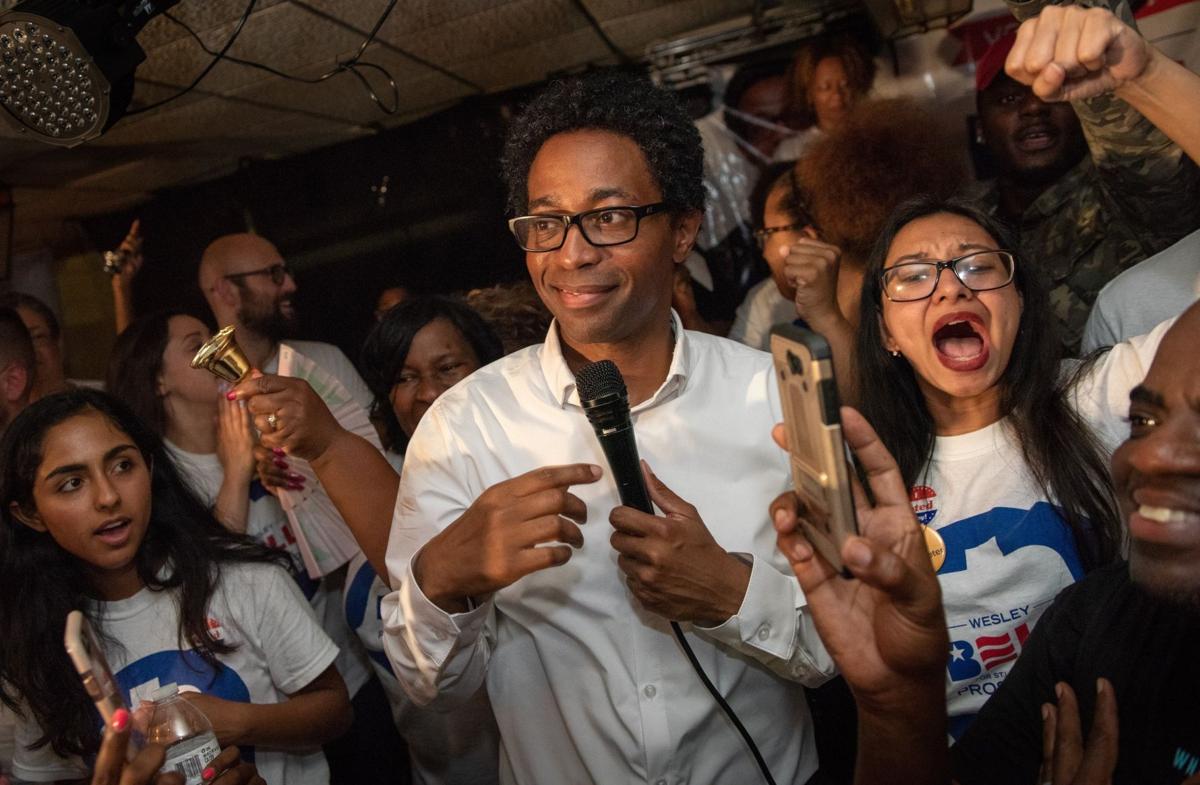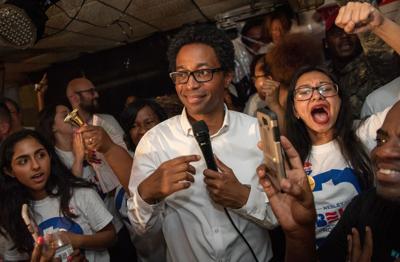CLAYTON ŌĆö ╣¹Į┤╩ėŲĄ County Prosecuting Attorney Wesley Bell on Thursday criticized a plan to turn county elections into nonpartisan races with runoffs.
The change, championed by ╣¹Į┤╩ėŲĄ County Councilman Tim Fitch, R-3rd District, would remove party labels from candidates for council, county executive, prosecuting attorney and county assessor. A nonpartisan election would replace separate party primaries in August. If no candidate in a race received more than 50% of the vote, the top two vote-recipients would face each other in November.
Fitch has argued the plan, which won preliminary support from the County Council on Tuesday, would lead to better-informed voters, giving them ŌĆ£an incentive to get to know the candidates as opposed to just picking a party label.ŌĆØ
But Bell, a Democrat who is up for reelection next year, called FitchŌĆÖs measure a ŌĆ£solution in search of a problem.ŌĆØ
People are also reading…
Bell, who beat longtime prosecutor Bob McCulloch in the 2018 Democratic primary before cruising to victory that November, said he tries to stay out of ŌĆ£partisan debatesŌĆØ but felt he should weigh in this matter because ŌĆ£it is a fundamental change to the way county government operates ŌĆö and not in a way that necessarily fixes anything.ŌĆØ
ŌĆ£OneŌĆÖs party is indicative of what one believes, and the voters should know where we stand,ŌĆØ Bell said in a statement to the Post-Dispatch. ŌĆ£In this matter, the reality is the suggestion to change countywide elections to non-partisan elections is, in itself, partisan. This is an attempt to minimize Democratic control in a Democratic-majority county.ŌĆØ
Support on the council for the change was bipartisan, with Fitch and Council members Rita Days, D-1st District; Mark Harder, R-7th District; and Shalonda Webb, D-4th District all voting in favor. The four have frequently opposed County Executive Sam Page, a Democrat.
PageŌĆÖs allies ŌĆö Council members Lisa Clancy, D-5th District; Kelli Dunaway, D-2nd District; and Ernie Trakas, R-6th District ŌĆö opposed the change.
The vote represented a reversal for Trakas, who told the Post-Dispatch in October that he supported the idea and added that ŌĆ£anyone that resists this, I think, takes the position that they donŌĆÖt want anything to pass the authority or power of political party machines as they exist in this county.ŌĆØ
On Thursday, Trakas said he voted against advancing the bill ŌĆ£after further reflectionŌĆØ because it would help conceal a candidateŌĆÖs political beliefs.
ŌĆ£After further reflection on the question, IŌĆÖve come to the position that non-partisan elections can, and likely will, create the opportunity for political ideologues to hide behind the anonymity of non-partisan/party affiliation, thereby concealing true philosophical and political positions,ŌĆØ he said in a written statement.
That PageŌĆÖs allies opposed the measure suggests the county executive may be concerned about the effect on his own bid for reelection in 2022.
Page, who opposes the change to nonpartisan elections, won the Democratic primary last year with just a plurality ŌĆö 38% of the vote ŌĆö in a four-way race. He cruised to reelection in November, though, in a general election with more than twice the turnout as the primary, winning 60% of the vote against a Republican.
A nonpartisan election in 2020 likely would have set up a November runoff between Page and Mark Mantovani, the runner-up in the Democratic primary. Mantovani, who has supported Republican candidates in the past, likely would have been the choice of Republican voters in November, said David Kimball, a University of Missouri-╣¹Į┤╩ėŲĄ political science professor who studies elections.
ŌĆ£Nonpartisan elections do not eliminate politics and do not eliminate partisanship,ŌĆØ Kimball said. ŌĆ£It just pushes it underground and behind the scenes and makes the voter work harder to find out who these candidates are and what their party affiliation is.ŌĆØ
╣¹Į┤╩ėŲĄ voters last year opted to turn city elections for mayor and alderman into nonpartisan elections with a runoff. The move followed victories by former Mayor Lyda Krewson and Board of Aldermen President Lewis Reed with less than a majority of votes in Democratic primaries.
Kimball noted that those on the losing side often are the ones pushing for election rule changes ŌĆö Mayor Tishaura O. Jones supported the change after barely losing to Krewson in 2017 and observers said Krewson largely opted not to run for reelection after the runoff change that many saw benefiting progressive candidates.
ŌĆ£ItŌĆÖs instructive that (Fitch) is in the minority party in the county,ŌĆØ Kimball said.
If the goal is to make sure a majority of county voters coalesce around a candidate, Kimball said, instituting other reforms such as ranked-choice voting in the countyŌĆÖs party primaries ŌĆö where voters rank their preferences for an office ŌĆö offer a better solution for electoral consensus.
Benjamin Singer, who helped lead the election reform effort in the city, said any changes should include ŌĆ£more modern voting methods,ŌĆØ such as the ŌĆ£approval votingŌĆØ method in the city that allows voters to vote for any number of candidates in the first round. A consensus candidate could still fail to make the runoff without that or a system such as ranked-choice, Singer said.
The council could take a final vote as early as next week to put the matter before voters in April. But because candidate filing for the August primaries closes in March, Fitch said heŌĆÖs considering postponing the countywide vote until November 2022 or changing the wording so it wonŌĆÖt take effect next year if the council does opt to put it on the April ballot.
Either way, the first elections it might affect, should voters approve it, wouldnŌĆÖt be until council races in 2024.
Nassim Benchaabane of the Post-Dispatch contributed to this report.




















